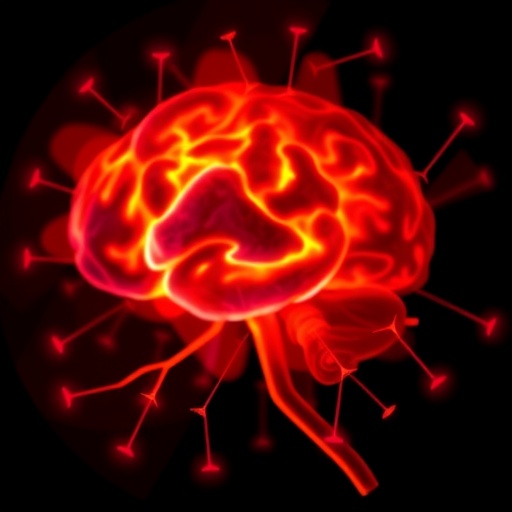Delirium is gaining increasing recognition as a significant modifiable risk factor for dementia, a condition that has dire implications on the quality of life for millions worldwide. The latest research, spearheaded by a team of researchers, including van Munster, Strijkert, and Trzpis, seeks to deepen the understanding of the intersection between delirium and dementia, suggesting that by addressing factors leading to delirium, it may be possible to significantly mitigate the risk or even delay the onset of dementia.
Delirium, characterized by acute confusion, changes in attention, and fluctuations in cognitive function, often occurs in hospitalized elderly patients. It is typically triggered by factors such as infection, dehydration, or medication side effects. While it is often thought of as a temporary state, emerging studies indicate that experiencing delirium is more than just a fleeting occurrence; it can serve as a harbinger of future cognitive decline. What many do not realize is that this fleeting state of confusion is not merely a symptom to be managed but rather a crucial inflection point for long-term cognitive health.
The research team analyzed a myriad of studies exploring the link between delirium and dementia. Their findings indicate that approximately one in five older adults will experience delirium during hospitalization, and this phenomenon has lasting consequences for their cognitive health. Such statistics highlight the urgency for healthcare providers to identify and manage risk factors contributing to delirium, underscoring an opportunity for intervention that goes beyond immediate care.
By understanding the presentations of delirium, clinicians can develop targeted protocols aimed at reducing the prevalence and impact of this condition in vulnerable populations. Strategies include ensuring proper hydration, optimizing medication regimens, and enhancing environmental factors within the hospital setting—all pivotal in reducing unnecessary stressors that can rapidly escalate into a state of delirium. Essentially, hospitals have the potential to become proactive environments that prioritize cognitive stability.
Importantly, the implications of this research extend beyond the walls of hospital structures. The findings suggest a need for heightened awareness and education among caregivers and health professionals regarding the signs of delirium. Increased recognition can lead to earlier interventions, potentially forestalling which patients may later experience exacerbated cognitive decline. Moreover, caregivers should be armed with knowledge about delirium’s risk factors, as establishing early identification in non-hospital settings, such as at home or in long-term care facilities, can be pivotal.
Furthermore, the study propounds that the relationship between delirium and dementia is multifaceted. Various factors, including genetic predisposition and comorbidities, play crucial roles in how delirium can influence cognitive trajectories. As research continues to evolve, the application of this information can reshape approaches not only in hospital settings but across a spectrum of caregiving paradigms, empowering families and healthcare providers alike.
Another critical aspect explored in this research is the pathway through which delirium may induce lasting cognitive impairments. Inflammation is a central theme, with mounting evidence pointing toward the role of neuroinflammation during delirious episodes. The physiological changes triggered by delirium may lead to alterations in the brain that align closely with the pathology observed in dementia, particularly Alzheimer’s disease. It is a compelling reminder that the brain is remarkably interlinked, where disturbances in one area may precipitate crises in another.
The converging insights from this research also encourage further investigations into preventive health practices. With the acknowledgment that delirium is often preventable, a paradigm shift is required that views it not merely as an inevitable complication during hospitalization but as an actionable target for improving the healthspan of older individuals. Comprehensive geriatric assessments that prioritize cognition can ensure that interventions are timely and suitably tailored to individual patients.
The economic implications of addressing delirium cannot be understated, as the costs associated with prolonged hospital stays and subsequent long-term care due to dementia are staggering. By investing in preventive measures aimed at reducing delirium rates, healthcare systems can attain not only improved patient outcomes but also significant cost savings. This research advocates for policies that earmark resources towards the prevention and management of delirium as a strategic maneuver to enhance geriatric care.
Moreover, societal awareness around the risk of delirium must be positioned at the forefront of public health campaigns targeting older adults. Community outreach initiatives could train non-medical staff, caretakers, and family members on the symptoms and management strategies for delirium. This cross-disciplinary approach fosters an environment where everyone is engaged and attentive to the signs of cognitive decline, thereby cultivating a culture of prevention.
In conclusion, the tide is changing regarding how delirium is understood in relation to dementia. The groundbreaking findings presented underscore the complexity and consequences of delirium but also point to a future where prevention is possible. The nexus of delirium, cognition, and dementia is an area ripe for exploration, and the researchers hope that this highlights the need for an integrated health approach to combat cognitive decline in the aging populace. Understanding and managing delirium could be the key to unlocking an extended duration of cognitive vitality.
As this vital research continues to unfold, it will inform future studies and clinical practices that seek to enhance the quality of life for older adults. By staying at the intersection of health and research, society can work collectively towards a future where both delirium and the risk of dementia are minimized, ultimately fostering a brighter perspective on aging.
Subject of Research: The link between delirium and dementia as a modifiable risk factor.
Article Title: Delirium: a modifiable risk factor for dementia.
Article References:
van Munster, B.C., Strijkert, F., Trzpis, M. et al. Delirium: a modifiable risk factor for dementia.
Eur Geriatr Med (2025). https://doi.org/10.1007/s41999-025-01360-3
Image Credits: AI Generated
DOI:
Keywords: Delirium, Dementia, Cognitive Decline, Aging, Hospitalization, Neuroinflammation, Prevention, Caregiving, Public Health, Geriatric Care.




